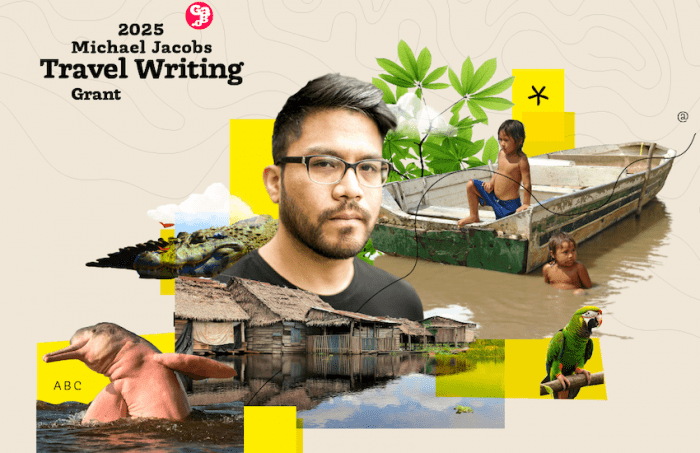
Peruvian journalist and editor Joseph Zárate has been selected as the winner of the 2025 Michael Jacobs Travel Writing Grant, awarded by Fundación Gabo, the Hay Festival Cartagena, and The Michael Jacobs Foundation for Travel Writing.
Zárate’s project, titled Todo nace en el agua y muere en ella. Un viaje por el río Amazonas del siglo XXI, was unanimously chosen by a jury composed of Jon Lee Anderson (United States), Mar Abad (Spain), Teresita Goyeneche (Colombia), Miguel Velárdez (Argentina)—winner of the 2024 grant—and Sabrina Duque (Ecuador)—winner of the 2018 grant.
A total of 305 proposals were submitted for this year’s grant, which annually awards $10,000 to fund a book or long-form travel article, written in Spanish or English, about Hispanic America or Spain.
Zárate’s project proposes a book that blends narrative journalism, documentary poetry, and the richness of Indigenous oral tradition to explore contemporary Amazonian realities. “His proposal aims to shed light on pressing challenges such as the expansion of industry, the encroachment of criminal networks, and deforestation while also celebrating the resilience and wisdom of those who have lived in the rainforest for centuries, offering valuable lessons for confronting the climate crisis” the jury highlighted in its official statement.
The jury’s decision was based on “the strength of his proposal, the depth of his research, and the originality of his approach.” For his preliminary research, Zárate followed the Andes-to-Atlantic route taken by Spanish conquistador Francisco de Orellana five centuries ago, when he “discovered” the Amazon River for Europe while searching for the mythical Land of Cinnamon. Over three months, Zárate collected more than 300 testimonies from Indigenous elders, scientists, artists, activists, and intellectuals, all of whom have a deep relationship with the river and are generating knowledge from within their own territories.
According to the jury, Zárate’s work goes beyond traditional travel writing and has the potential to become a definitive book for understanding the complexities of the Amazon in the 21st century. They also emphasized that his perspective is not that of an outsider but is rooted in a profound personal connection to the history he narrates, given his Peruvian background and Amazonian Indigenous ancestry.
The $10,000 grant will allow Zárate to continue his research in six major cities along the Amazon River and in historical archives in London, Paris, and Madrid. His goal is to study the travel accounts and scientific expeditions conducted over the past five centuries in the context of the colonization and exploration of the Amazon Basin. His research will focus particularly on books, reports, logbooks, and diaries related to the rubber boom of the late 19th and early 20th centuries, in which countries like France, Spain, and England played a key role. By examining these historical records, Zárate aims to analyze the past and, through it, better understand the contemporary history of the Amazon and the narratives that have been constructed around its inhabitants, many of which remain marked by racism and violence.
Honorable Mentions
The jury also awarded honorable mentions to two projects of high narrative and journalistic value:
- Paul Brito (Colombia) – For his exploration of Canarian migration and its ties to the Caribbean and Latin America over the centuries.
- Fernando Krapp (Argentina) – For En la puna, a collection of chronicles about the Argentine highlands, examining the tensions between mining, international tourism, and Indigenous communities.
Since its inception in 2015, the Michael Jacobs Travel Writing Grant has been awarded to Álex Ayala Ugarte (Bolivia-Spain), Federico Bianchini (Argentina), Diego Cobo (Spain), Sabrina Duque (Ecuador), Ernesto Picco (Argentina), J. S. Tennant (United Kingdom), Santiago Wills (Colombia), Federico Guzmán Rubio (Mexico), Abraham Jiménez Enoa (Cuba), Miguel Velárdez (Argentina)
About Joseph Zárate
Lima, 1986. Journalist and editor. He was awarded the Eccles Institute & Hay Festival Global 2025 Literature Prize, the 2018 Gabo Award in the Text category, the 2016 Ortega y Gasset Prize for Best Story, and the 2015 PAGE National Environmental Journalism Award created by the United Nations.
He is the author of Guerras del interior (Debate, 2018), a nonfiction book about social and environmental conflicts caused by the extraction of gold, timber, and oil in the Andes and the Amazon. For his chronicles on funeral work during the COVID-19 pandemic in Peru, compiled in his book Algo nuestro sobre la tierra (Literatura Random House, 2021), he received the 2020 National Journalism Award, a Special Mention at the 2022 National Literature Award in the Nonfiction category, and a nomination for the 2020/21 True Story Award. His work has been included in several collective books, including: En otro país (Candaya, 2024), Rabia. Crónicas contra el cinismo en América Latina (Anagrama, 2022), Volver a contar. Escritores de América Latina en los archivos del Museo Británico (Anagrama, 2022), Un mundo lleno de futuro (Planeta, 2017), Eduardo Galeano, un ilegal en el paraíso (Siglo XXI, 2016).
He is currently a Nonfiction professor in the Master’s in Creative Writing program at the Pontifical Catholic University of Peru (PUCP). He was also part of Amazonias: The Ancestral Future, an exhibition at the Centre de Cultura Contemporània de Barcelona (CCCB), dedicated to the knowledge and biodiversity of this region of the world.